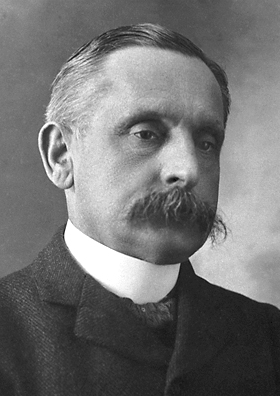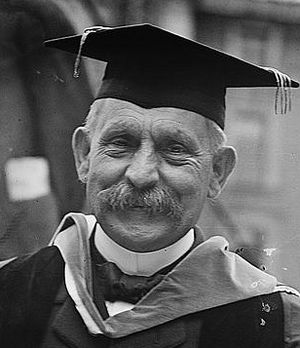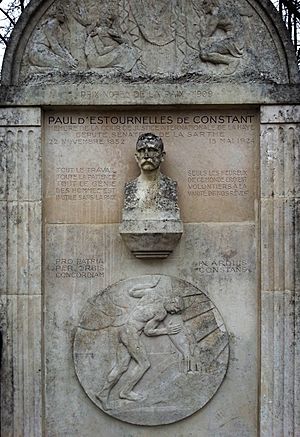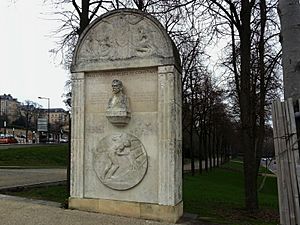Paul Henri Balluet d'Estournelles de Constant facts for kids
Quick facts for kids
Paul d'Estournelles de Constant
|
|
|---|---|
 |
|
| Personal details | |
| Born |
Paul Henri Benjamin Balluet d'Estournelles de Constant de Rebecque
22 November 1852 La Flèche, France |
| Died | 15 May 1924 (aged 71) Paris, France |
| Occupation | Diplomat |
| Awards | Nobel prize 1909 for Peace |
Paul Henri Benjamin Balluet d'Estournelles de Constant (born November 22, 1852 – died May 15, 1924) was a French diplomat and politician. He strongly believed in solving international problems peacefully. He won the Nobel Peace Prize in 1909 for his work.
Contents
About Paul d'Estournelles de Constant
Paul d'Estournelles de Constant was born in La Flèche, France. His family was very old and noble. A famous writer and politician named Benjamin Constant was his great-uncle.
Paul studied law and languages in Paris. After finishing his studies, he started a career as a diplomat in 1876. A diplomat is someone who represents their country in other nations.
His Diplomatic Career
Paul d'Estournelles de Constant worked as a diplomat in many countries. These included Montenegro, the Ottoman Empire (which is now Turkey), the Netherlands, Great Britain, and Tunisia.
In 1882, he returned to Paris. He worked for the French Ministry of Foreign Affairs. Later, in 1890, he went to London as a French representative. There, he helped stop a war between France and Britain. This war could have started over disagreements about colonies.
Moving into Politics
Paul felt that being a diplomat had its limits. So, in 1895, he decided to run for parliament in France. He won a seat in the French Chamber of Deputies. This is like being a member of Congress in some other countries.
In 1904, he ran for the Senate and won. He served in the Senate until he retired in 1924.
His Work in Parliament
As a politician, Paul d'Estournelles de Constant cared a lot about colonial issues. He often disagreed with France's colonial policies. He thought France should protect other countries rather than take full control of them.
He was against France taking over Madagascar. He also opposed powerful countries dividing up China. He believed in fairness and peace between nations.
He also supported Émile Zola, a writer, during the Dreyfus Affair. This was a big scandal in France where an innocent army officer was wrongly accused.
Working for World Peace
Most importantly, Paul d'Estournelles de Constant worked hard for better international relations. He was a member of the Permanent Court of Arbitration starting in 1900. This court helps countries solve their disagreements peacefully.
He represented France at two important peace conferences in 1898 and 1907. At these meetings, he shared his idea for a "European union." This was a vision of European countries working together.
Paul also wrote books about history and politics. He even wrote some plays. He wrote for newspapers like Le Temps and La Revue de Paris. He was married to an American woman, Daisy Sedgwick Berend. He traveled a lot in the United States and wrote about his experiences there.
His Legacy
In his hometown of La Flèche, France, two schools are named after him. These are the Estournelles de Constant High School and the Estournelles de Constant Kindergarten.
A large lecture hall at the University of Maine is also named in his honor.
There is a monument with a bust of him in Le Mans, France. The bust was made by the artist Paul Landowski. It is located in Jacobins Square.
Images for kids
See also
 In Spanish: Paul d'Estournelles para niños
In Spanish: Paul d'Estournelles para niños






